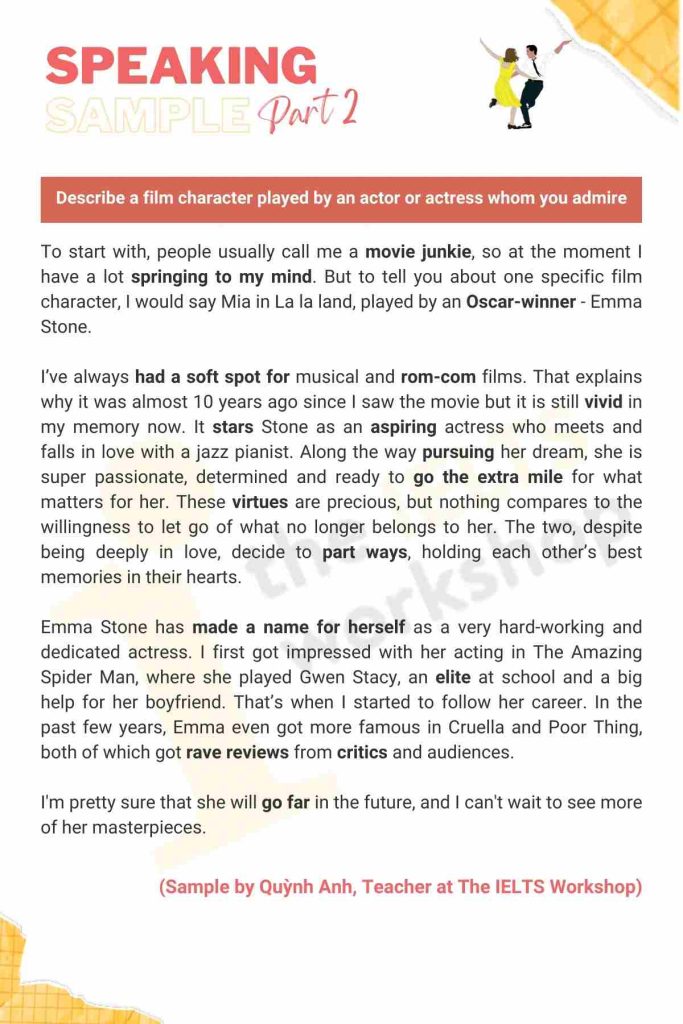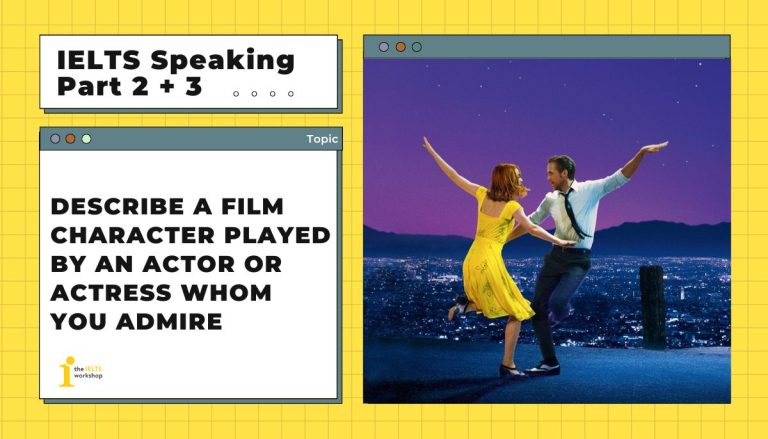Trong bài giải mẫu lần này, cô Quỳnh Anh của The IELTS Workshop sẽ hướng dẫn bạn trả lời topic “Describe a film character played by an actor or actress whom you admire“ trong IELTS Speaking Part 2. Cùng tham khảo sample, từ vựng và một vài cách diễn đạt ghi điểm trong phần thi IELTS Speaking nhé.
Part 2: Describe a film character played by an actor or actress whom you admire
Describe a film character played by an actor or actress whom you admire
You should say:
Who this actor/actress is
When you saw the film
What the character was like in this film
And explain why you admire this actor/actress
Dưới đây là bài mẫu cho topic “Describe a film character played by an actor or actress whom you admire“.
1. Bài mẫu (Sample)

2. Từ vựng (Vocabulary)
- movie junkie: người nghiện phim
- spring to my mind: nảy ra trong đầu tôi
- Oscar-winner: người thắng giải Oscar
- have a soft spot for: siêu thích 1 cái gì đó/1 ai đó
- rom-com/ romantic-comedy: thể loại hài tình cảm
- vivid: sống động
- star: có sự góp mặt của (các diễn viên)
- aspiring: đam mê, khao khát
- pursue: theo đuổi
- go the extra mile: cố gắng hết sức, vượt qua mong đợi
- virtue: phẩm chất
- part ways: chia đôi đường đôi ngả
- make a name for oneself: trở nên nổi tiếng và được tôn trọng
- elite: tinh hoa/ học sinh siêu giỏi
- rave review: những lời phản hồi có cánh
- critic: nhà phê bình
- go far: tiến xa (trong sự nghiệp)
Part 3:
Bên cạnh Part 2, bạn hãy tham khảo thêm Part 3 cho chủ đề này nhé
Are actors or actresses very interested in their work? Why?
Is being a professional actor or actress a good career?
What can children learn from acting?
Why do children like special costumes?
What are the differences between actors or actresses who earn much and those who earn little?
What are the differences between acting in a theatre and that in a film?
1. Are actors or actresses very interested in their work? Why?
Mostly yes, since acting is a form of art that requires a huge amount of passion. Should they not be intrigued by the job, it is unlikely that film masterpieces are created. What’s more, acting itself is a very exciting job as it offers artists ample opportunities to work with different talented people in each project, meaning that they can learn a lot. And one more thing, studying different characters may help them to have deep empathy with people, contributing to a fulfilling life later on.
- a form of art: một loại hình nghệ thuật
- passion: đam mê
- intrigued: cảm thấy hứng thú
- ample: nhiều
- deep empathy: đồng cảm sâu sắc
- fulfilling life: cuộc sống trọn vẹn
2. Is being a professional actor or actress a good career?
Without a doubt. First, being professional is usually synonymous with making a fortune or having a great reputation, or both. Second, given that most actors and actresses really love what they do – the act for enjoyment and art, working full-time in this field gives them the satisfaction that can hardly be achieved in some occupations. These are some reasons why many young people today are pursuing this job.
- synonymous with: đồng nghĩa với
- making a fortune: kiếm được nhiều tiền
- great reputation: danh tiếng tốt
- satisfaction: sự thỏa mãn
- occupation: nghề nghiệp
3. What can children learn from acting?
The benefits vary. To commence with, most plays and films are made from joint efforts, so they can practice some soft skills like teamwork, communication and problem-solving. Better still, as I mentioned before, acting in a play or a movie means that people have to study the setting, the story, and the psychological development in character growth. So, by doing all these, children learn how to empathize with different people with different backgrounds and characteristics. In the long run, they may know how to put themselves in other people’s shoes and try to understand instead of provoking conflicts.
- commence: bắt đầu
- joint effort: công sức tập thể
- setting: bối cảnh
- psychological development in character growth: sự phát triển tâm lý trong qus trình trưởng thành của nhân vật
- empathize with: đồng cảm với
- put oneself in one’s shoes/place: đặt mình vào vị trí người khác
- provoke conflicts: tạo mâu thuẫn
4. Why do children like special costumes?
Well, I’m not surrounded by a lot of children recently so it might be hard for me to say. But I guess the biggest reason lies in the word you call it – “special”. Special clothing signals children that they are in a special setting or occasion that excites/stimulates their curiosity and joy. For example, when a girl plays a Disney princess, and the moment she wears the princess’s dress is when she starts to feel something different than other days in the life. This can be a novel experience for her.
- signal: báo hiệu
- excite/stimulate their curiosity and joy: kích thích sự tò mò và niềm vui
- novel: mới mẻ
5. What are the differences between actors or actresses who earn much and those who earn little?
Acting is one of a few careers that do not take qualifications too seriously. I do not deny the importance of formal education, but as a form of art, acting requires more talent, dedication, and opportunities. I think all these three make financially successful actors or actresses. If they are not talented and dedicated, hardly ever a well-known film studio or director comes to them, making a generous offer. But if they possess both mentioned qualities but cannot find suitable projects or grab the attention of media, it is challenging for them to thrive.
- qualification: bằng cấp
- formal education: giáo dục chính thống
- dedication: sự cống hiến
- possess: sở hữu
- thrive: thành công
6. What are the differences between acting in a theatre and that in a film?
There are many. As a die-hard fan of both, I’ve heard that theatre actors and actresses have to struggle a lot when they enter film industry, and vice versa. Speaking of angles, while audiences in theaters only see the play directly from their seats, and they are quite far from the stage, there are multiple cameras in a movie set, which details every single facial expression of actors. Besides, when it comes to the number of takes, artists only have one chance to perform on stage, there’s nothing can be done about it when they ever make a mistake. But in a film, they can take as many shots as they want to, until they feel satisfied about every detail.
- die-hard fan: fan cứng/cuồng
- vice versa: ngược lại
- angle: góc quay
- detail: đặc tả
- facial expression: biểu cảm khuôn mặt
- take/shot: cảnh quay
- there’s nothing can be done about sth: bó tay!
Bài mẫu bởi Cô Quỳnh Anh – Giáo viên The IELTS Workshop
Các bạn có thể tham khảo Bộ đề dự đoán IELTS Speaking của The IELTS Workshop để ôn tập những chủ đề mới cho kỳ thi IELTS sắp tới của mình nhé!
Nếu bạn muốn nhận Mentor 1-1 để hoàn thiện kĩ năng Speaking của mình trước khi bước vào kỳ thi, tham khảo ngay Khóa bổ trợ từng kỹ năng IELTS của The IELTS Workshop.









